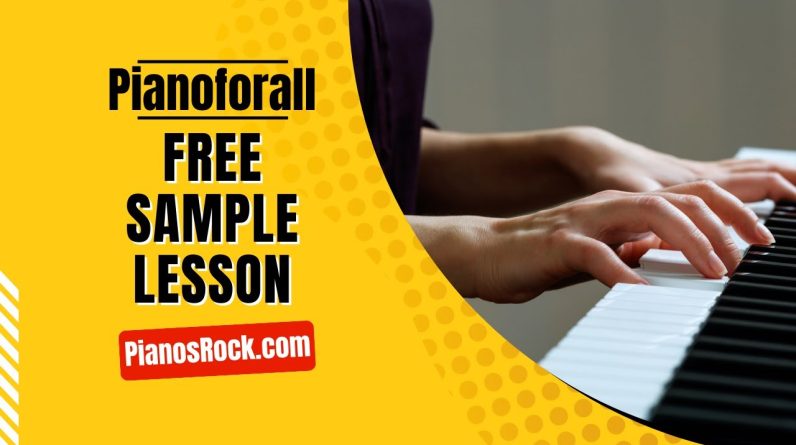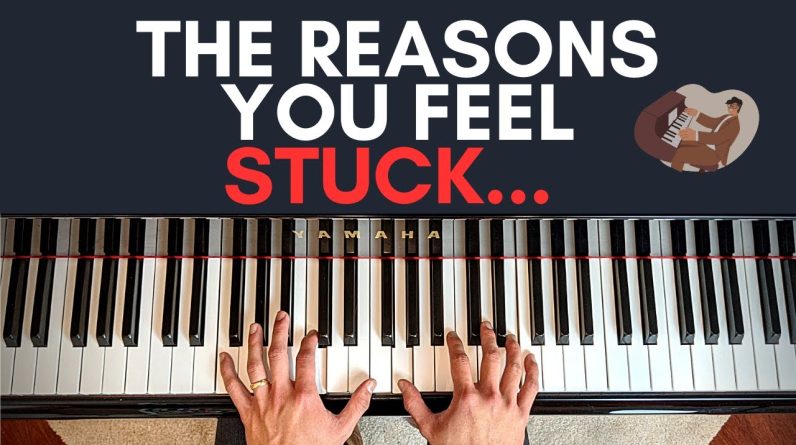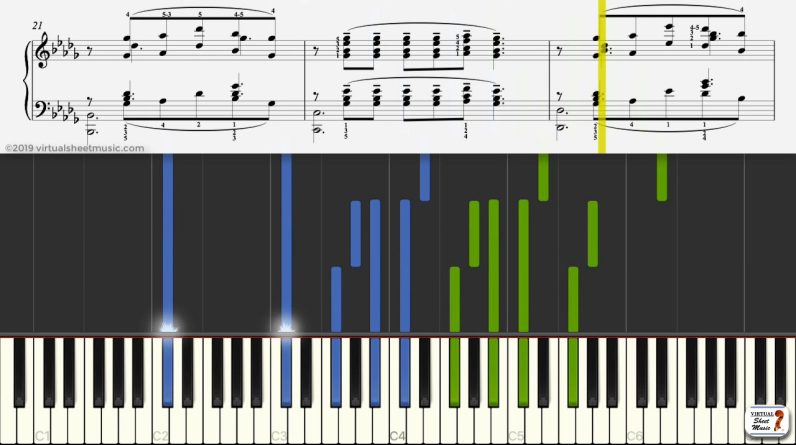There are 3 bonus tips added in there too, so don’t miss out. Watch until the end. 🤓
Do you find it hard to actually finish learning and practicing your piano pieces? Well, here’s some steps to stave off boredom and actually get to complete your musical pieces.
You hear a piece you love and you think Wow! I want to play that!” Two days into practicing, you completely lose focus. You lose interest and you’re thinking “Oh gosh, this is the fifth time it’s happened this year.” Hey I’m Jazer.
I’ve played the piano for 20 years and the situation I just described to you is something that it’s happened way too many times for my liking. Today we’re going to discuss this problem. I want to give you 5 ways of progressing and finishing the pieces you start. We’re also going to talk about why you get bored of the pieces you play, and how to mitigate this problem before you even start the piece. Why do we get bored of the pieces we play?
Now in my personal experience, the main reason this boils down to is that you are not progressing the way you thought you would.
You hear a piece on YouTube or on TV and you start learning this piece. And by day 5, day 6 you realize you know you’re not getting anywhere with it. So you start to lose that motivation to keep practicing it. Here are 5 piano tips for you to add to your routine so you actually get some progression which will eliminate the boredom.
Tip Number 1 is to Practice More Hands Separately
Oftentimes when we hear a piece that we love on TV or on Spotify or on YouTube somewhere, we…
We fall in love with the finished product.
But when we’re learning a piece what we want to try to do is to actually break things down into their smaller parts by focusing on one hand first. Seriously you must give this one a try. So just focus on right hand. Let’s say play through 5 times and then play through your left hand 5 times. Let’s say for 8 bars or a whole page.
I prefer 8 bars. So 5 times right hand, 5 times left hand. And then put it together. You’re gonna see some really great wonders. A lot of people think practice hands separately is just a waste of time because in the end you’re gonna have to put them together.
So why not just play them together? But in my 20 years of piano playing experience, I have found hand practice to be the best investment. You can make you spend even just a really small 5 minutes working out a certain part in its individual forms. And then when you put it together it’s like magic, “It suddenly works!
Tip Number 2 is to Do Small Sections Practice
Like what I was saying before, when you find a piece you really love, you really want to play, you often want to sort of get to the finish line really quickly.
You start to play the whole piece in its entirety. But playing through the whole piece isn’t actually practicing. Playing through the whole piece is just sight reading through the whole piece. You’re not giving your fingers and your brain that chance to work on small sections in repetition.
And to build that muscle memory, small sections can be 16 bars… can be 8 bars..
. can even be 4 bars. It can even be 2 bars. It can even be as small as something like this..
. And you just do that again….
[Music] Try your best not to make a single mistake. If there’s a single mistake in there, you probably should actually cut it into an even smaller section and work on that. Build on success. BUILD ON SUCCESS.
Tip Number 3 is to Work Out a Strict Fingering
One of the rookie mistakes that I see lots of beginner students make is every time they play through a certain part, they’re actually using different fingers. This is not ideal for long-term progression. If you’re using different fingerings for a certain part, you’re not going to build any muscle memory within your fingers.
And you’re going to realize that even after playing that part for 20, 30, 40, 50 times. And you don’t seem to remember it because you’re doing different things all the time.
You’re not building on repetition so make sure you follow strict fingerings and stick to it. What I do for every single piece I learn is I just have a handy pencil. And for each page of music, I make sure I write at least 5 to 10 fingerings on certain notes that I need fingerings for. I know of people who write fingerings for every single note on their page. I’m.
.. I’m not as extreme as that. But I like to write at least between 5 to 10 fingerings. Just also because seeing that then primes me to think about fingerings more strictly.
Tip Number Four is to Watch or Get Lessons For That Specific Piece
What I found growing up with piano is that I find that I often generate lots of interest for a piece when I learn something more in depth about it.
This is where a mentor, whether that’s a live teacher or whether that’s watching a lecture on YouTube, can really inspire you to learn something deeper about the piece. And to sort of fall deeper in love with the piece. For example, when I was younger and learning Fur Elise.
One small example I’ll show here is that Fur Elise is in the key of A minor so…
It’s an A minor chord and when it goes to the the sort of happy part..
It goes to something called the relative major which is C major. So it went from the principal A minor and when Beethoven wanted the mood to be happier, he went to the relative minor called the C major. If you don’t understand what that means, don’t worry about it. But it’s through learning this sort of theory or more in-depth analysis about it that just makes you have a more of a sense of ownership with a piece that makes you fall in love with it and want to finish it more.
So get some lessons for that piece to get more inspiration.
Tip Number 5 is to Completely Add a New Piece to Your Routine
So maybe you need to take a bit of a break from that current piece. Okay in your brain you just need something fresh, get something new in there. Start to practice this new thing and maybe even just break up with your piece for a couple of days, a week, maybe even a month.
We’re humans and sometimes all we need is a little bit of freshness. I’m going to give you now 3 bonus notes to help you think about boredom and progression a little bit more. Note Number 1 is regarding your Connection With the Piece”. Now something about me is I love movies. And growing up with piano and movies, I find that often love playing pieces that I hear in movies.
Seeing something played in film, it just helps me to understand its emotions a lot better. When I was about 14 or 15, I watched the film “The Pianist”. And the main theme of that film is the “Nocturne in C sharp minor” So for me, a great sense of connection with a piece comes from movies or TV. Sometimes watching YouTube and watching others play it and..
And watching a great performance of it also helps me to envision what it could look like for me to play that piece.
So I encourage you to develop your connection with a piece through listening to it or watching it somewhere else. Now Bonus Note Number 2 is if you don’t want to be bored with your pieces “You Must Pick Them Strategically”. You must love something deeply about it.
You must either, for example. love the melody. For me personally when I was learning this…
[Music] I love the melodic line of this. The way goes up and down. The way it finishes. Or perhaps instead of a melodic line, you love perhaps the harmony. You love the way each chord progresses to each next chord.
I really enjoy the harmony when I was working on this piece… [Music] If not for the harmony perhaps it’s that you really love the rhythm of the piece. For example, when I was working on this I fell in love with the rhythm of the piece.
I just love the Rumba and the syncopation of that piece and last but not least if not the melody or the harmony or the rhythm. But perhaps you just love this piece because it’s physically stimulating for your fingers so that last piece I played there.
I personally felt like it was very fun to play.
It was a physical exercise for me. If you find a piece that ticks all these four boxes – you’d love the melody. you love the harmony. you love the rhythm. And it’s just physically fun and stimulating to play.
Oftentimes you’re gonna go to the end of the world with this piece. That’s 100 hours gone. You’re gonna be on the piano forever. You’re going to play it so much.
You’re gonna have so much fun with it.
Last thought for today is regarding “The Difficulty of Your Piece”. Sometimes you get bored and you’re not progressing with your piece because it currently is just a little bit too difficult for you. On our channel, lots of our viewers are self-taught. And some of our viewers have teachers or coaches. One of the pros of having a teacher is – the teacher is able to find your weak spots.
And also give you a course or a progression of pieces that is just a little bit outside your comfort zone.
So that you’re growing out of a scaffolded and comfortable way. What I find with a lot of beginning pianists is they fall in love with a very difficult piece. And without having the proper technique and knowledge, they attempt something that’s way too hard way too outside their comfort zone. And they try it, they don’t get anywhere.
They get demotivated and they give up piano which for me is really, really sad. If you’re a beginner pianist and you want some ideas – what are some pieces you can work on in the first few years of piano playing, watch this video up here.
We have come to the end of the video. Do me a favor ,comment down below a piece you’re getting bored with or that you’re getting stuck with. I think we’re all interested to see what pieces people post.
Perhaps someone will reply your comments and give you a couple of tips on how to get over that slump. You can also post any questions about piano you have there. 90% of our content comes from your questions. Happy practicing and have a great piano day!
—————————————————————-
Wanna own the metronome watch I’m wearing? Use the promo code ‘JAZER20’ to get 20% off- https://www.soundbrenner.com/jazer
Stay in touch on Instagram for bite-sized piano tutorials and lessons- https://www.instagram.com/jazer.lee/
Subscribe for more free piano tutorials: www.youtube.com/c/LearnPianoWithJazerLee
🎬 Check out my other awesome playlists
Tutorials and Tips:
https://youtube.com/playlist?list=PLMawC1bdeZRHB4EYjsMDmgCDhBpCIvD3o
Easy Songs You Can Learn Right Now:
https://youtube.com/playlist?list=PLMawC1bdeZRFp0NKbEvunHj3Xl008OuHj
- Pianoforall Review: By Current Pianoforall Student (2026) - January 7, 2026
- Deck the Halls for Piano Solo – Christmas Sheet Music – Practice Video - November 20, 2025
- Canon in D by Pachelbel | Simplified for Piano Solo | Practice Video - June 22, 2025








